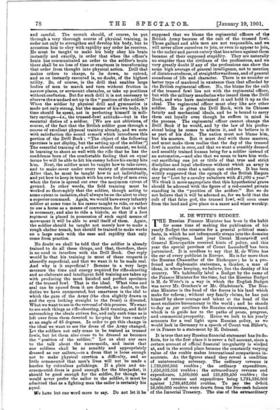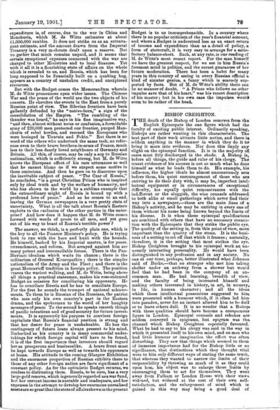M. DE WITTE'S BUDGET. T HE Mani= Finance Minister has been
in the habit for some time of making the publication of his yearly Budget the occasion for a general political mani- festo, in which he not infrequently strays into the domains of his colleagues. Last year Count Mouravieff and General Kouropatkin received hints of policy, and this year the special province of Count Lamsdorff has been patronised. It is needless to say that M. de Witte has the ear of every publicist in Europe. He is far more than the Russian Chancellor of the Exchequer ; he is a pro- found and diplomatic statesman, a thinker, a man of ideas, in whose keeping, we believe, lies the destiny of his country. We habitually label a Budget by the name of the Finance Minister for the time, but the Russian Budget is M. de Witte's in a way in which the English Budget was never Mr. Goschen's or Mr. Gladstone's. The Rus- sian Minister is the head of the forces in his land which make for reform ; without any family claims, he has put himself by sheer courage and talent at the head of the most exclusive bureaucracy in the world ; and he stands to-day as par excellence the Russian statesman, the hand which is to guide her to the paths of peace, progress, and commercial prosperity. Hence we look to his yearly accounts for a real light upon Russian policy, as we would look in Germany to a speech of Count von Billow's, or in France to a statement by M. Delcasse.
It is true that any Russian financial statement has its de- fects, for in the first place it is never a full account, since a certain amount of official financial irregularity is winked at, and in the second place because the constantly varying value of the rouble makes international comparisons in- accurate. As the figures stand they reveal a condition of uninteresting solvency. The ordinary revenue is 1.730,096,006 roubles ; the ordinary expenditure, 1,656,652,556 roubles: the extraordinary revenue and expenditure, 1,500,000 and 131,829,450 roubles ; the totals of revenue and expenditure being 1,731,596,006 against 1,788,482,006 roubles. To pay the deficit 56,000,000 roubles were drawn from the free-cash balance of the Inmerial Treasury. The sirs of the extraordinary expenditure is, of course, due to the war in China and Manchuria, which M. de Witte estimates at about 61,000,000 roubles. It does not strike us as an extrava- gant estimate, and the amount drawn from the Imperial Treasury is a very moderate draft upon a reserve. But we gather that much remains unpaid, and it seems that certain exceptional expenses connected with the war are charged to other Ministries and to local finances. Yet with it all it is a flourishing state of affairs on the whole which is revealed to us, and Russia, which has been for long supposed to be floancially built on a quaking bog, appears as a country of unshaken credit, and unexplored resources.
But with the Budget comes the Memorandum wherein M. de Witte pronounces upon wider issues. The Chinese War and the peace of the world are the two objects of his concern. He sketches the events in the East from a purely Russian point of view. The Siberian frontiers have been gallantly defended by the "native-born," a sign of the consolidation of the Empire. "The rumbling of the thunder was heard," he says in his fine imaginative way, "and then, almost without noise or confusion, a formidable army of 220,000 men protected our frontier, purged Man- churia of rebel hordes, and rescued the Europeans who were besieged in Tientsin and Pekin." But there is no word of the others who undertook the same task, no refer- ence even to their brave brothers-in-arms of France, much less to their less dearly loved neighbours of Germany and Britain. All this, of course, may be only a sop to Russian nationalism, which is sufficiently strong, but M. de Witte knows the European effect of his rare utterances so well that he cannot blame us if we suspect some motive in these omissions. And then he goes on to discourse upon the inevitable subject of peace. "The Czar of Russia," he concludes, "is a great Christian Prince who is inspired only by ideal truth and by the welfare of humanity, and who has shown to the world by a sublime example that the extraordinary might of Russia is bound up with a profound love of peace." And so he comes to an end, leaving the German newspapers in a very pretty state of uncertainty. What is all the talk about Russia's Eastern exploits to the exclusion of the other parties in the enter- prise? And how does it happen that M. de Witte comes forward with words of peace to all men, and yet goes out of his way to boast of Russia's terrible power?
The answer, we think, is a perfectly plain one, which is the key to all the Finance Minister's policy. He is trying both to run with the hare and hunt with the hounds. He himself, backed by his Imperial master, is for peace, retrenchment, and reform. But arrayed against him are many potent and irreconcilable forces. There is the Pan- Slavonic idealism which waits its chance ; there is the militarism of General Kouropatkin ; there is the simpler nationalism of the Army and the Fleet ; and there is the great Monravieff tradition in foreign policy. The position craves the wariest walking, and M. de Witte, being above all things a practical statesman, makes his rose-coloured Budget an occasion for conciliating his opponents. He has to conciliate Russia and he has to conciliate Europe. For the first he sounds the trumpet of national achieve- ments. To them he is Russian of the Russians, the patriot who sees only his own country's part in the Eastern drama, and the spokesman to the world of her haughty messages of peace. To the second he speaks smooth things of pacific intentions and of good security for future invest- ments. It is apparently his purpose to convince foreign capitalists that Russia's financial position is strong and that her desire for peace is unshakeable. He has the contingency of future loans always present to his mind. Embarked as his country is in many commercial under- takings for which foreign capital will have to be found, it is of the first importance that investors should regard her as prosperous and businesslike. A brave front must be kept towards Europe as well as towards his opponents at home. His attitude to the coming Glasgow Exhibition and the enormous proportion of Russian exhibits there to those of any other foreign nation are facts significant of a constant policy. As for the optimistic Bridget returns, we confess to distrusting them. Russia, to be sure, has a very large gold reserve, which is generally regarded as a war fund, bat her current income is unstable and inadequate, and her expenses in the attempt to develop her enormous unrealised assetsare so great that the state of affairs shown in the present Budget is to us incomprehensible. In a country where there is no popular criticism of the year's financial account, and where a Budget is understood less as an exact return of income and expenditure than as a detail of policy, a form of statecraft, it is very easy to arrange for a satis- factory balance-sheet. Such, at any rate, is our reading of M. de Witte's most recent report. For the man himself we have the greatest respect, for we see in him Russia's foremost mind in politics, and the surest guarantee of her future moderation. There has been a habit for many years in this country of seeing in every Russian official a kind of sinister genius, a fancy which is scarcely sup- ported by facts. But of M. de Witte's ability there can be no manner of doubt. "A Prince who follows no other impulse save that of his heart." was his recent description of his master ; but in his own case the impulses would' seem to be rather of the head.







































 Previous page
Previous page